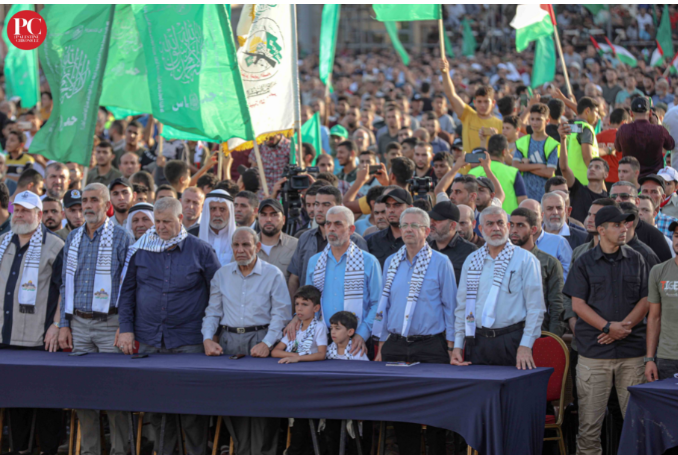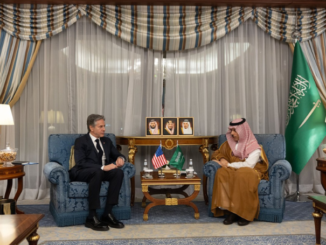
In a statement on Tuesday, the Palestinian Resistance Movement Hamas announced that Yahya Sinwar is its new leader, following the assassination of the movement’s political bureau, Ismail Haniyeh.
Haniyeh was assassinated in Tehran on July 31, leaving Hamas with the decision and challenge to select a new leader.
Hamas’s leadership is divided between three commands, one led by Saleh al-Arouri in the West Bank, another by Yahya Sinwar in Gaza, and Khaled Meshaal abroad.
Haniyeh was the overall leader.
Israel assassinated Arouri in January, and Haniyeh a few days ago.
Following days of deliberations, the Palestinian shura – deliberation – council elected Sinwar as its new overall leader.
Who is Sinwar
Palestine Chronicle staff writer, Robert Inlakesh recently wrote:
Sinwar was born on October 29, 1962, in the Khan Younis refugee camp.
In 1948, his parents were ethnically cleansed from their homes in Majdal-Askalan, now taken over by Israeli settlers and re-named Ashkelon.
Scarred by his experiences growing up as a displaced person, growing up under the military occupation of the Gaza Strip – which took place in 1967 – his father said that “Yahya’s life was full of agony due to the Zionist aggression. Since his childhood, he was determined to resist the occupation.”
A high performer academically at school, he went on to study at the Islamic University in Gaza, where he helped pioneer the Islamic Bloc and held a number of student council positions at the university.
In 1982, Sinwar and other members of the student council had traveled to visit Palestinian women in Jenin who had allegedly been the victims of a poisoning attempt by Israelis.
It was in response to this visit that he was arrested and placed under administrative detention (held without charge nor trial) for six months, with the allegation against him being that he participated in subversive Islamist activities.
During his detention, Sinwar befriended other activists, such as Saleh Shehade who would go on to lead the armed wing of Hamas until his assassination in 2002.
Sinwar was responsible for setting up a security network, known as Majd.
The Majd operated in secret while the Muslim Brotherhood-aligned organization that preceded Hamas, the Mujamma Islamiyya, remained as a non-combative group until the establishment of Hamas in late 1987.
In 1988, Sinwar was arrested and allegedly tortured heavily for 6 weeks after the discovery of armed cells that belonged to the Majd.
In 1989, Hamas carried out its first significant armed attack, killing two Israeli soldiers. Sinwar was convicted on allegations of masterminding the attack and sentenced to 426 years of imprisonment.
Being the highest-profiled Hamas leader released in a 2011 prisoner swap deal, Sinwar returned to Gaza, eventually being elected as Hamas leader in the Strip, taking over from Ismail Haniyeh.
In 2017, Hamas underwent a rebranding and update of its statute, which indicated that the Islamic Resistance Movement would be open to accepting a Two-State Solution.
That same year, Sinwar played a major role in attempting to repair ties between the Palestinian Authority (PA), led by the Fatah Party, and Hamas, but to no avail.
In 2018, under the leadership of Yahya Sinwar, Hamas adopted the policy platform of non-violent resistance in a bid to open themselves up to diplomatic negotiations that could end the siege on Gaza.
The Hamas leadership endorsed the mass non-violent protest movement, known as the ‘Great March of Return’, which began on March 30, 2018.
However, following the US decision to unilaterally recognize Jerusalem as Israel’s capital and the killing of hundreds of unarmed protesters at the hands of Israeli soldiers, Hamas changed its approach again.
In May 2021, Hamas launched the battle of Saif al-Quds , which was supported by several other armed groups inside the Gaza Strip.
Since then, Yahya Sinwar’s speeches and public appearances have made him a very popular celebrity leader throughout the Arab World.
What It Means
The Palestine Chronicle believes that electing Sinwar carries deep meanings and symbolism:
One, it means that Hamas, in all of its branches, remains united.
Two, Hamas sees the Resistance in Gaza remains strong, united, organized, and capable of leading a long war of attrition against the Israeli occupation.
Three, media reports, some circulated by major US media, that there is a conflict between Hamas’ ‘moderates’ and ‘hardliners’ are not true.
Four, Hamas continues to back the Sinwar strategy of Resistance after over 300 days of war.
Five, Hamas emerges even stronger and more united after the assassination of its leader, Haniya.
Six, that Hamas, despite the war and the assassinations is a movement of institutions and that decisions are made through a democratic process, which remains in effect despite the ongoing Israeli war and genocide in Gaza.
(The Palestine Chronicle)









The real question is, did he know beforehand about the inside-job that killed his predecessor? Clearly this was planned, and possibly a coup; with help from our favorite old Uncle, Sam.
Who’s next? …
whomever dares to strive for peace.